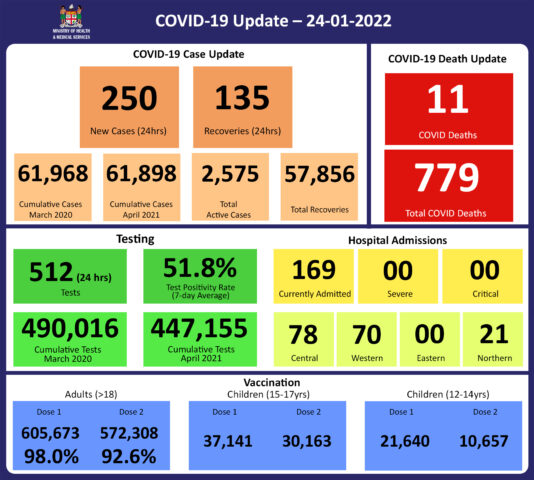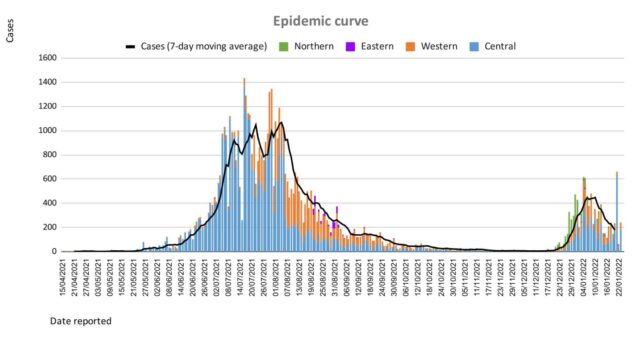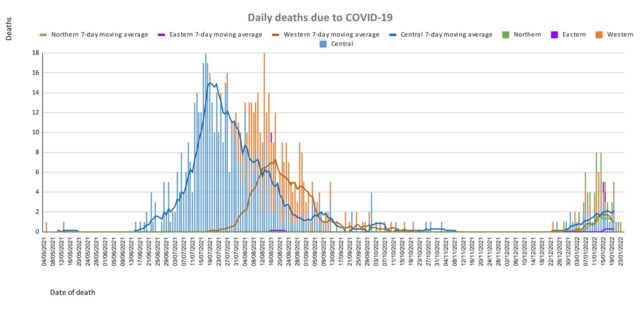COVID-19 Situation Update
Monday 24th January 2022

| Transmission Update:

Since the last update on 21/01/2022, we have recorded a total of 987 new cases; of which 656 new cases were recorded on 22/01/2022, 81 new cases were recorded on 23/01/2022 and 250 new cases in the last 24 hours ending at 8 am this morning.
Of the 987 cases recorded, 859 cases were in the Central Division; 62 cases in the Western Division, 18 cases in the Northern Division, and nil cases in the Eastern Division.
Overall, there have been 61,898 cases recorded, with 68% of the cases from the Central Division, 28% of the cases from the Western Division, 1% of the cases from the Eastern Division, and 3% from the Northern Division.
Our national 7- day rolling average is 179 daily cases calculated for 20th January 2022. |
| Deaths:

This curve depicts the daily death count by division since the 2nd wave of this outbreak that began in April 2021. Overall, the death rates for the Central, Western, and Northern Divisions indicate an upward trend.
There are 11 new COVID-19 deaths to report from the period 13th January 2022 to 23rd January 2022.
Five deaths were from the Central Division, three from the Western, two from the Eastern, and one from the Northern. Two of the people who died were below the age of 18 years old, both had pre-existing conditions from birth, which contributed to the severity of their sickness and deaths.
The remaining individuals were at a higher risk of severe disease due to their ages or underlying medical conditions. 5 of the people who died were not vaccinated, one had only received his first dose, 3 were fully vaccinated, and 2 were not eligible for vaccination.
The first COVID-19 death to report is of a 4-month old infant from the Western Division, who was brought to a remote nursing station on 13/01/2022 in a severely weakened state. He was medically assessed and stabilized by the attending medical staff and a COVID test was done which was noted to be positive. Sadly he passed away before he could be transferred to Lautoka Hospital, despite the resuscitation efforts of the attending medical staff. Records show that the infant had been born with medical complications and was lost to follow-up. He was not eligible for vaccination.
The second COVID-19 death to report is of a 71-year old female from the Eastern Division, who died at home on 15/01/2022. She was not vaccinated.
The third COVID-19 death to report is of a 50-year old male from the Eastern Division, who died at home on 16/01/2022. He had received only the first dose of the COVID-19 vaccine. This means he was not fully vaccinated.
The fourth COVID-19 death to report is of a 15-year old male from the Central Division who was admitted to the CWM Hospital on 17/01/2022. He had a significant pre-existing medical condition which contributed to the worsening of his COVID-19 complications. He died on 19/01/2022 and was not vaccinated.
The fifth COVID-19 death to report is of an 83-year old female from the Central Division, who died at home on 20/01/2022. She was fully vaccinated.
The sixth COVID-19 death to report is of a 75-year old female from the Central Division, who died on arrival at Nakasi Health Center on 20/01/2022. She had pre-existing medical conditions and was fully vaccinated.
The seventh COVID-19 death to report is of a 67-year old male from the Central Division, who died at home on 20/01/2022. He had pre-existing medical conditions and was not vaccinated.
The eighth COVID-19 death to report is of a 74-year old female from the Western Division, who died on arrival at Lautoka Hospital on 20/01/2022. She had pre-existing medical conditions and was fully vaccinated.
The ninth COVID-19 death to report is of a 54-year old female from the Central Division, who died at home on 21/01/2022. She was not vaccinated.
The tenth COVID-19 death to report is of a 64-year old male from the Western Division, who died on arrival at Lautoka Hospital on 22/01/2022. He had significant pre-existing medical conditions and was not vaccinated
The eleventh COVID-19 death to report is of an 80-year old female from the Northern Division, who died on arrival at Labasa Hospital on 23/01/2022. She was not vaccinated.
There have been a total of 779 deaths due to COVID-19 in Fiji. Please note that due to the time required by clinical teams to investigate, classify and report deaths, a 4-day interval is given to calculate the 7 days rolling average of deaths, based on the date of death, to help ensure the data collected is complete before the average is reported. Therefore, as of January 20th, 2022, the national 7 days rolling average for COVID-19 deaths per day is 4.1, with a case fatality rate of 1.32%.
We have recorded 756 COVID-19 positive patients who died from other serious medical conditions unrelated to COVID-19; their doctors determined that COVID-19 did not contribute to their deaths, therefore these are not classified as COVID-19 deaths. |
| Hospitalization:
Using the WHO clinical severity classification, 61% (n=103) of the admissions of COVID-19 positive patients are categorized as asymptomatic and mild, 25% (n=42) are categorized as moderate and 20% (n=12) as severe with 4 cases in the critical category. Anyone admitted to the hospital is tested before admission, therefore, a significant number of people are admitted to the hospital for non-covid health conditions, but incidentally test positive due to the high transmission in the community. These patients are admitted with COVID-19 rather than for COVID-19. The number of people being admitted for COVID-19 remains low compared to the previous wave. |
| Testing:
512 tests have been reported for January 23rd, 2022. . The 7-day daily test average is 528 tests per day or 0.6 tests per 1,000 population.
The national 7-day average daily test positivity is 51.8%. The high positivity rate is an indication of widespread community transmission. |
Public Advisory:
The deaths of a 4-month-old infant and a 15-year-old child with underlying health conditions are sad reminders that, as cases increase to very high numbers in the community, our most vulnerable are at higher risk of being infected and suffering from severe disease. We know that severe disease is rare in children, but this risk increases should they have significant underlying health conditions.
We must all do our best to reduce the transmission of COVID-19 to protect our vulnerable. This means keeping up with the Vaccine Plus approach.
1) getting fully vaccinated (which includes getting a booster shot when due), plus
2) strictly adhering to the COVID transmission suppression protocols.
The COVID transmission suppression protocols are:
- Individual COVID safe measures (masking, physical distancing, avoiding crowds, hand hygiene), and
- Settings-based measures (social gathering restrictions, indoor capacity restrictions, ventilation, and curfews).
Following the Vaccine Plus Approach means that everyone has a role to play to protect themselves from the current outbreak, as well as future outbreaks from other new variants that can arise. The approach means that the Ministry and Govt will provide the opportunity for all eligible Fijians to access safe and effective vaccines that protect us from severe diseases and deaths due to COVID-19. It also means that we take responsibility for adhering to the COVID transmission suppression protocols on an individual basis, as well as on a collective basis in all community settings we engage in – whether it is at work, in school, at our local house of worship, or during a traditional ceremony. The Vaccine Plus Approach means we are collectively and equally responsible for our protection and our health, as well as the well-being of the most vulnerable in our communities.
We are also strongly advising anyone who is in the high-risk group (people over the age of 50, pregnant women, those with non-communicable diseases) and develops any COVID-19 symptoms, to please come forward to be tested and reviewed by our medical teams. Symptoms include cold or flu-like symptoms such as runny nose, sneezing, nasal congestion, sore throat, cough, body ache, fever. If you test positive you will be placed on a care pathway that will involve monitoring and escalation of care if required. We also need everyone to be aware of the symptoms of severe COVID-19, and to immediately seek emergency medical care if they are present. The symptoms of severe disease are Shortness of breath or difficulty breathing, pain or pressure in the chest, confusion, coughing blood, difficulty staying awake, pale, grey, or blue-colored skin.
Non-communicable disease (NCDs) and COVID-19
A predominant contributor to severe outcomes in all the waves of COVID 19 in Fiji has been NCD-related comorbidities such as heart disease, kidney disease, diabetes, obesity, and hypertension. The Ministry of Health and Medical Services attributes 5,700 deaths in 2020 to complications related to NCDs. In addition, NCDs place an additional heavy burden on the Fijian society in the form of lost hours of work and healthcare needs.
Given the severe negative health effects of overconsumption of sugar, sugar-sweetened beverages, and sugar-filled processed foods, the Ministry wishes to advise the public to curb sugar consumption by members of the public and promote healthier alternatives, such as the use of natural honey. In addition, the promotion of a healthy diet, regular exercise, and maintaining optimal control of the NCD through appropriate medications needs to be an integral part of building resilience against diseases for the vulnerable in our communities.
Employers and community leaders can help to mainstream the support system for vulnerable persons by creating a list of vulnerable persons in their communities, providing support to help them secure good access to medical care, ensuring oversight so that the vulnerable are tested early when they develop flu-like symptoms and provide a supportive environment to ensure that the sick are encouraged and empowered to seek treatment and not delay in seeking health care. In this way, we are working together to protect the most vulnerable, and to direct health care service towards those who need it most in our community.
Building Resilience
As we go through the current wave of COVID-19, Fijians need to adopt practices that build resilience. We know that there remains a high risk of resurgence of endemic variants and the arrival of new variants. Our socioeconomic survival depends on our ability to build and sustain individual and community-wide resilience. We should expect that COVID-19 will be endemic, however, we need to appreciate that “endemic” doesn’t mean harmless. Endemic means that we expect continued circulation of the disease in the community, the baseline levels of which are yet to be determined. Leptospirosis, Typhoid, and Dengue are endemic in Fiji and they are associated with serious outcomes, especially when the number of cases increases to outbreak levels. Building resilience means that we must adopt healthier lifestyles, make COVID safe behavior a habit that we adopt and support others to adopt, mainstream medical and community-wide oversight over vulnerable persons so they can have timely access to health care, and build up community surveillance mechanisms that use health and non-health data sources to alert us of impending disease outbreaks.
Our objective is to live with the virus and at the same time ensure a high level of transmission suppression, and prevention of severe outcomes.
Last Updated on 3 years by Publishing Team



